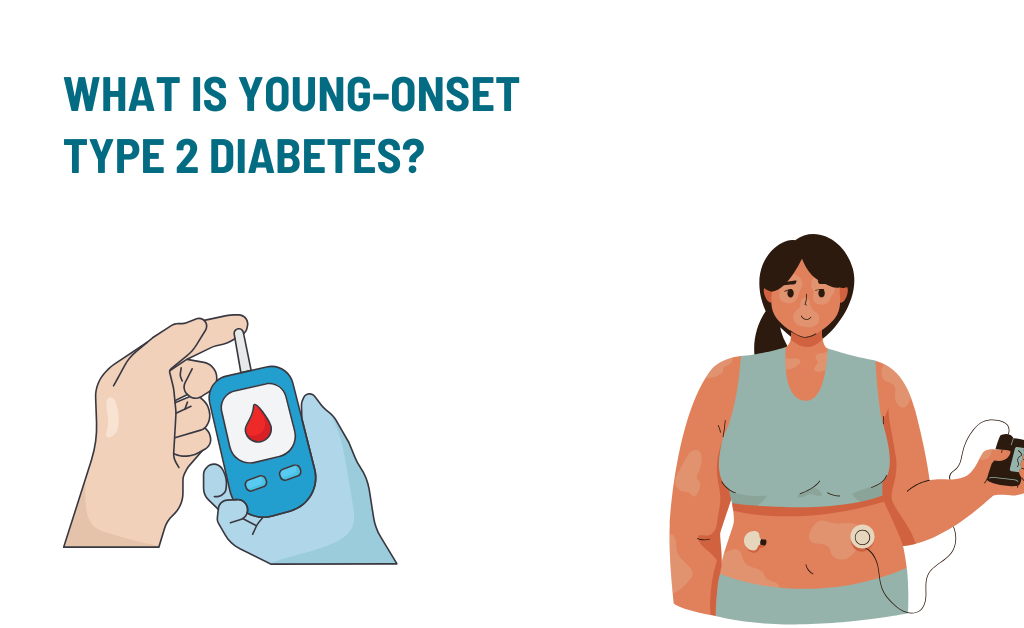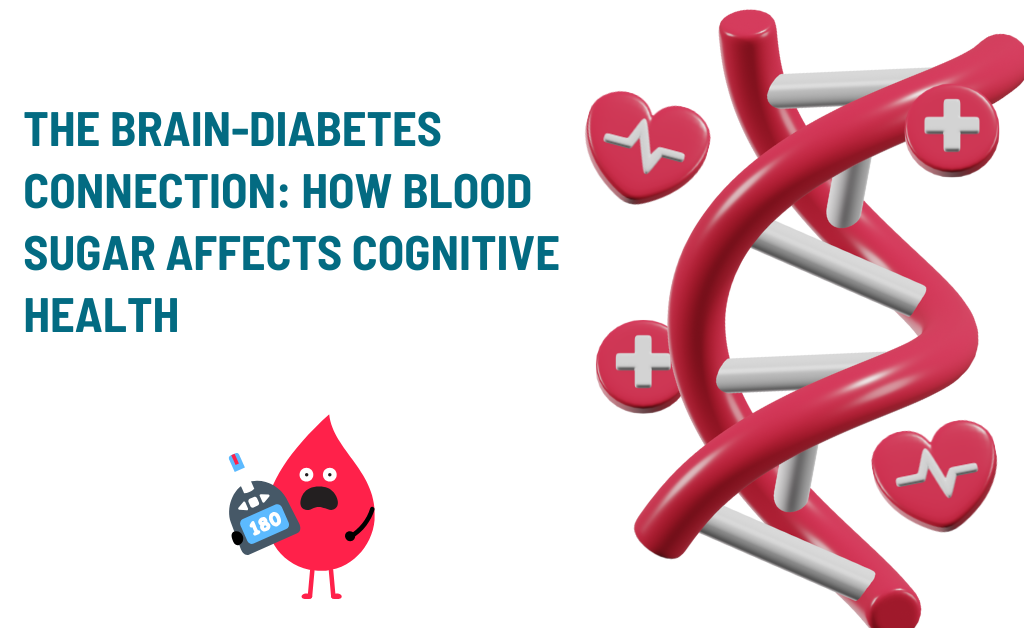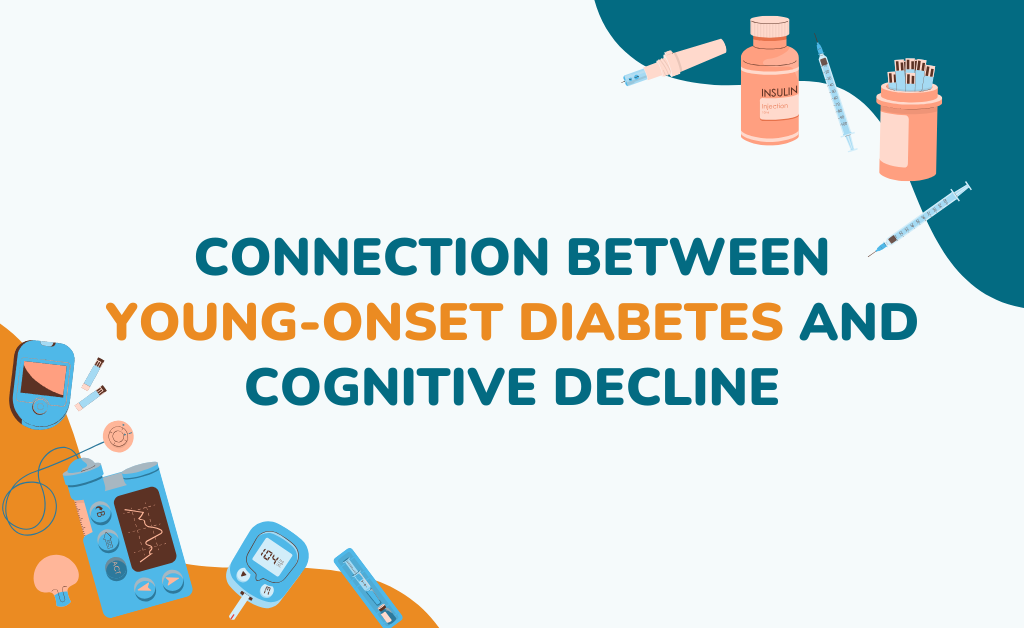The diagnosis of diabetes at an early age can be life-altering, impacting not just physical health but also cognitive function over time. Recent studies have shed light on a concerning connection between young-onset diabetes and the risk of cognitive decline, emphasizing the importance of understanding and addressing this dual challenge.
What is Young-Onset Type 2 Diabetes?

Young-onset type 2 diabetes refers to a form of type 2 diabetes that is diagnosed in individuals under the age of 40, including adolescents and young adults. Unlike traditional type 2 diabetes, which typically occurs in older adults, young-onset type 2 diabetes has unique characteristics, challenges, and implications for long-term health.
Key Characteristics:
- Insulin Resistance and Beta-Cell Dysfunction: Young-onset type 2 diabetes is characterized by a combination of insulin resistance (when cells in the body don’t respond properly to insulin) and early deterioration of beta-cell function (the pancreatic cells that produce insulin).
- Association with Obesity and Lifestyle Factors: Lifestyle factors like physical inactivity, poor dietary habits, and increasing rates of obesity play a significant role in its development, especially in younger populations.
- Family History and Genetics: A strong genetic predisposition often underpins young-onset type 2 diabetes, with a higher prevalence in certain ethnic groups, including African Americans, Hispanics, Native Americans, and Asians.
Challenges and Risks:
- Faster Disease Progression: Young individuals often experience more aggressive disease progression compared to older adults, leading to earlier onset of complications such as kidney disease, nerve damage, and cardiovascular problems.
- Longer Duration of Disease: Since the condition starts earlier, the individual lives with diabetes for a longer period, increasing the cumulative burden of chronic complications.
- Psychosocial Impact: Managing a chronic condition at a young age can affect mental health, relationships, education, and career development.
Management and Treatment:
- Early Diagnosis and Intervention: Early detection is crucial for preventing or delaying complications. Regular screenings are recommended for at-risk individuals.
- Lifestyle Changes: Diet modifications, increased physical activity, and weight management are foundational strategies for controlling blood sugar levels.
- Medication: Young-onset patients may require medications like metformin, GLP-1 receptor agonists (e.g., Rybelsus), or insulin at an earlier stage to manage blood sugar effectively.
- Monitoring and Education: Ongoing monitoring of blood glucose, regular health check-ups, and patient education are vital for managing the disease and reducing the risk of complications.
Public Health Implications:
The rise in young-onset type 2 diabetes reflects broader public health concerns, including childhood obesity and sedentary lifestyles. Preventive measures at the community and policy levels, such as promoting healthy eating and physical activity in schools, are essential to curb this growing trend.
The Brain-Diabetes Connection: How Blood Sugar Affects Cognitive Health:

Diabetes, particularly type 2 diabetes, extends beyond its well-known effects on blood sugar regulation. Recent research highlights a strong connection between diabetes and brain health, revealing that prolonged blood sugar imbalances can significantly affect cognitive function and increase the risk of neurological disorders.
Understanding the Connection
1. The Impact of High Blood Sugar on the Brain
- Chronic Hyperglycemia: Persistently high blood sugar levels can damage small blood vessels (microvascular damage) in the brain, reducing oxygen and nutrient supply to neurons. This damage can impair cognitive functions like memory, decision-making, and attention.
- Oxidative Stress and Inflammation: Elevated glucose levels increase oxidative stress and inflammation in the brain, accelerating neuronal damage and increasing vulnerability to neurodegenerative diseases.
2. Insulin Resistance in the Brain
- Insulin plays a vital role in brain function by supporting neuron growth, synaptic activity, and glucose metabolism. In diabetes, insulin resistance disrupts these processes, leading to brain “energy crises,” which are thought to contribute to cognitive decline.
- Insulin resistance in the brain is also linked to the development of Alzheimer’s disease, often referred to as “type 3 diabetes” due to shared pathophysiological features with diabetes.
3. Low Blood Sugar and Cognitive Impairment
Episodes of hypoglycemia (low blood sugar) can acutely impair brain function, causing confusion, memory loss, and difficulty concentrating. Repeated severe hypoglycemia may lead to long-term cognitive deficits.
Long-Term Cognitive Risks
1. Dementia and Alzheimer’s Disease:
Individuals with type 2 diabetes are at a higher risk of developing dementia, particularly Alzheimer’s disease. The exact mechanisms are not fully understood but involve vascular damage, insulin resistance, and chronic inflammation.
2. Vascular Dementia:
Diabetes increases the risk of strokes and other cerebrovascular events, which can lead to vascular dementia—a condition caused by impaired blood flow to the brain.
3. Mild Cognitive Impairment (MCI):
Even in the early stages, diabetes can lead to subtle cognitive changes, collectively referred to as MCI. While not as severe as dementia, MCI can impact daily functioning and increase the risk of progression to dementia.
How to Protect Cognitive Health in Diabetes
1. Manage Blood Sugar Levels
Consistent glucose control can reduce the risk of cognitive complications. Aim for steady blood sugar levels through a combination of diet, exercise, and medication.
2. Adopt a Brain-Healthy Diet
A Mediterranean or DASH diet, rich in whole grains, lean proteins, healthy fats, fruits, and vegetables, supports both brain and metabolic health.
3. Stay Physically Active
Regular aerobic exercise improves blood flow to the brain, enhances insulin sensitivity, and reduces the risk of cognitive decline.
4. Engage in Cognitive Activities
Mentally stimulating activities, like reading, puzzles, and learning new skills, can strengthen cognitive reserves and reduce dementia risk.
5. Monitor Cardiovascular Health
Since cardiovascular health is closely linked to brain health, managing blood pressure, cholesterol, and weight is crucial for minimizing vascular-related cognitive risks.
Research and Future Directions
Emerging studies are exploring new therapies that target the brain-diabetes connection. These include:
- GLP-1 Receptor Agonists (e.g., Rybelsus): These medications, originally used for blood sugar control, promise to reduce inflammation and improve neuronal health.
- Neuroprotective Drugs: Researchers are investigating treatments to shield the brain from oxidative stress and inflammation associated with diabetes.
Early Diabetes, Early Risks: The Age Factor in Dementia
The age at which diabetes develops plays a crucial role in determining its long-term impact on health, particularly brain health. Early-onset diabetes, diagnosed before the age of 40, is associated with a significantly higher risk of developing dementia later in life compared to diabetes diagnosed at older ages. This connection sheds light on the intertwined relationship between metabolic and neurological health.
How Early-Onset Diabetes Increases Dementia Risk
1. Prolonged Disease Duration
- Cumulative Exposure: Individuals with early-onset type 2 diabetes live longer with the condition, resulting in prolonged exposure to high blood sugar levels and related complications, such as microvascular and macrovascular damage.
- Chronic Inflammation and Oxidative Stress: The extended duration of metabolic stress accelerates processes like chronic inflammation, which can damage neurons and increase dementia risk.
2. Aggressive Disease Progression
- Faster Decline in Beta-Cell Function: Early-onsetcog diabetes tends to progress more aggressively, leading to earlier and more severe complications, including those affecting the brain.
- Higher Risk of Comorbidities: Younger individuals with diabetes are more likely to develop conditions like hypertension, obesity, and dyslipidemia at an earlier age, all of which contribute to cognitive decline.
3. Impact on the Developing Brain
- Neurodevelopmental Effects: When diabetes occurs during adolescence or young adulthood, it may affect the still-developing brain, potentially altering cognitive reserves and brain structure.
Key Mechanisms Linking Early-Onset Diabetes to Dementia
- Vascular Damage: Diabetes increases the risk of atherosclerosis (hardening of the arteries) and microvascular complications, reducing blood flow to the brain and contributing to vascular dementia.
- Insulin Resistance in the Brain: Insulin resistance impairs glucose metabolism in the brain, affecting memory and other cognitive functions. This is a common feature in both type 2 diabetes and dementia.
- Glycation and Amyloid Deposition: Chronic high blood sugar levels lead to the formation of advanced glycation end-products (AGEs), which promote the deposition of amyloid plaques—a hallmark of Alzheimer’s disease.
- Hypoglycemia Episodes: Repeated episodes of low blood sugar, often a side effect of diabetes treatment, can damage neurons and increase the risk of cognitive impairment.
Preventing Cognitive Decline in Early-Onset Diabetes
1. Prioritize Blood Sugar Control
- Maintaining stable blood sugar levels is essential to reduce vascular damage and minimize the impact on the brain.
2. Adopt a Healthy Lifestyle Early
- Diet: A balanced diet rich in antioxidants, fiber, and healthy fats supports both metabolic and brain health.
- Exercise: Regular aerobic and strength-training exercises improve insulin sensitivity and promote cerebral blood flow.
3. Monitor and Manage Comorbidities
- Addressing hypertension, cholesterol levels, and obesity can significantly reduce the risk of cognitive decline.
4. Engage in Cognitive Activities
- Stimulating the brain through activities like puzzles, reading, or learning new skills can strengthen cognitive reserves.
5. Regular Screening for Cognitive Function
- Early detection of cognitive decline allows for timely interventions, potentially slowing the progression to dementia.
Key Findings on Diabetes and Dementia
Diabetes, particularly type 2 diabetes, is not only associated with metabolic issues but also has significant implications for brain health, including an increased risk of dementia. Researchers have identified several key findings that link diabetes to cognitive decline and dementia, shedding light on how metabolic dysfunction accelerates the deterioration of brain function.
1. Increased Risk of Dementia in Diabetic Individuals
- Higher Dementia Incidence: Studies consistently show that people with diabetes, particularly type 2, have a higher risk of developing dementia. The risk is even greater for individuals with poorly controlled blood sugar levels or those who experience fluctuations in glucose.
- Type 2 Diabetes and Alzheimer’s disease: There is a growing body of evidence supporting the connection between diabetes and Alzheimer’s disease (AD). Type 2 diabetes is often referred to as “type 3 diabetes” due to shared pathological features, including insulin resistance and amyloid plaque deposition in the brain, both hallmarks of Alzheimer’s disease.
2. Diabetes as a Risk Factor for Vascular Dementia
- Impact of Vascular Health on Cognition: Diabetes accelerates the process of atherosclerosis (hardening of the arteries), increasing the risk of stroke and other cerebrovascular diseases, which can lead to vascular dementia.
- Microvascular Damage: Diabetes can cause damage to the small blood vessels in the brain, impairing blood flow and leading to cognitive issues. This damage is linked to cognitive impairment and dementia.
3. Insulin Resistance and Cognitive Function
- Insulin Resistance in the Brain: In individuals with type 2 diabetes, insulin resistance can extend to the brain, impairing insulin’s ability to promote glucose metabolism and neuronal growth. This disruption affects memory, learning, and other cognitive functions.
- Neurodegeneration: Insulin resistance in the brain leads to a decrease in brain-derived neurotrophic factor (BDNF), a protein essential for brain plasticity. This can result in neurodegeneration, contributing to cognitive decline.
4. Glycemic Control and Cognitive Health
- Blood Sugar Fluctuations and Cognitive Decline: Both chronic high blood sugar (hyperglycemia) and episodes of low blood sugar (hypoglycemia) can negatively impact cognitive function. Hyperglycemia contributes to oxidative stress, inflammation, and vascular damage in the brain, while hypoglycemia can cause immediate memory problems and long-term cognitive impairment.
- The Importance of Tight Glucose Control: Research suggests that maintaining blood sugar levels within a target range can help protect the brain from dementia and slow cognitive decline. However, the optimal target for glucose control in terms of cognitive outcomes remains an area of ongoing study.
5. Advanced Glycation End Products (AGEs) and Alzheimer’s
- Role of AGEs in Brain Health: Advanced glycation end-products (AGEs), which are formed when excess glucose binds to proteins, are elevated in individuals with poorly controlled diabetes. AGEs contribute to the formation of amyloid plaques in the brain, which are characteristic of Alzheimer’s disease.
- AGEs and Inflammation: AGEs can promote inflammation in the brain, which accelerates neuronal damage and is associated with the development of neurodegenerative diseases like Alzheimer’s.
6. Mild Cognitive Impairment (MCI) and Diabetes
- Early Cognitive Decline: Many individuals with diabetes experience mild cognitive impairment (MCI) before developing full-blown dementia. MCI is a state of cognitive decline that doesn’t interfere significantly with daily activities but increases the risk of progressing to Alzheimer’s or other forms of dementia.
- Diabetes and Faster Cognitive Decline: Research shows that people with diabetes may experience a faster progression of MCI to dementia compared to non-diabetic individuals, suggesting a link between poor metabolic health and cognitive decline.
7. The Role of Lifestyle in Reducing Dementia Risk
- Exercise and Brain Health: Regular physical activity has been shown to improve insulin sensitivity, reduce inflammation, and enhance blood flow to the brain, all of which help preserve cognitive function. Studies have found that exercise can reduce the risk of dementia in individuals with diabetes.
- Diet and Cognitive Protection: Diets rich in antioxidants, such as the Mediterranean diet, and those that help control blood sugar, like the DASH (Dietary Approaches to Stop Hypertension) diet, are associated with a lower risk of cognitive decline in individuals with diabetes.
8. Emerging Treatments to Protect Brain Health
- GLP-1 Agonists: Drugs like GLP-1 receptor agonists, originally used to manage blood sugar, have shown promise in protecting against cognitive decline. These drugs not only improve glucose control but may also have neuroprotective effects, reducing inflammation and supporting brain function.
- Insulin and Cognitive Function: There is ongoing research into the potential benefits of insulin therapy, even in the brain, to improve cognitive function in individuals with diabetes. Some studies suggest that intranasal insulin may help improve memory and reduce Alzheimer’s symptoms in diabetic patients.
Actionable/Medication advice for managing early-onset diabetes:
Managing early-onset diabetes effectively requires a comprehensive approach that combines lifestyle modifications, regular monitoring, and the judicious use of medications. The goal is to prevent complications, preserve long-term health, and enhance quality of life.
1. Lifestyle Modifications: The Foundation of Management
Healthy Eating Habits
- Focus on Low-Glycemic Foods: Include whole grains, legumes, non-starchy vegetables, and lean proteins to avoid spikes in blood sugar.
- Limit Sugary and Processed Foods: Reduce intake of refined carbohydrates, sugary beverages, and Trans fats.
- Adopt a Meal Plan:
- Mediterranean or DASH Diet: Emphasizes healthy fats, antioxidants, and nutrient-rich foods that support metabolic and brain health.
- Carbohydrate Counting: Helps individuals manage portions and maintain stable blood sugar levels.
Regular Physical Activity
- Aerobic Exercise: Activities like brisk walking, swimming, or cycling for at least 150 minutes per week.
- Resistance Training: Include strength-building exercises 2-3 times per week to improve insulin sensitivity.
- Consistency Matters: Spread activity throughout the week, avoiding prolonged periods of inactivity.
Weight Management
- Even modest weight loss (5-10% of body weight) can significantly improve insulin sensitivity and glycemic control.
Stress Reduction
- Chronic stress can raise blood sugar levels. Practices like mindfulness, yoga, and deep breathing exercises can help manage stress.
2. Medication Management: Tailored to Individual Needs
First-Line Therapy: Metformin
- Why It’s Used:
- Improves insulin sensitivity.
- Reduces glucose production in the liver.
- Advantages: Affordable, well-tolerated, and often the first-line medication for type 2 diabetes.
Add-on Medications for Enhanced Control
Depending on the individual’s glucose levels, additional medications may be introduced:
- GLP-1 Receptor Agonists (e.g., Rybelsus, Ozempic)
- Benefits:
- Lower blood sugar levels.
- Promote weight loss.
- Reduce cardiovascular risks.
- Consideration: Often used in overweight or obese patients.
- Benefits:
- SGLT2 Inhibitors (e.g., Jardiance, Farxiga)
- Benefits:
- Reduce glucose reabsorption in the kidneys.
- Lower cardiovascular and kidney disease risk.
- Consideration: Requires monitoring for urinary tract infections.
- Benefits:
- DPP-4 Inhibitors (e.g., Januvia, Tradjenta)
- Benefits: Help maintain stable glucose levels without causing hypoglycemia.
- Consideration: Suitable for patients unable to tolerate GLP-1 agonists.
- Insulin Therapy:
- When Needed: In cases of severe hyperglycemia or beta-cell exhaustion.
- Advances: Long-acting insulins (e.g., glargine) provide steady control with reduced risk of hypoglycemia.
Adjunct Therapies
- Blood Pressure Management: Medications like ACE inhibitors (e.g., lisinopril) or ARBs (e.g., losartan) are often prescribed to protect kidney and cardiovascular health.
- Cholesterol Control: Statins (e.g., atorvastatin) are recommended to reduce cardiovascular risk.
3. Routine Monitoring and Follow-Up
Regular Health Checks
- A1C Testing: At least every 3-6 months to assess long-term blood sugar control (target: <7% for most individuals).
- Blood Pressure and Lipid Profiles: Checked regularly to reduce cardiovascular risk.
- Kidney Function Tests: Monitor for early signs of diabetic nephropathy.
Self-monitoring of Blood Glucose (SMBG)
- Helps detect patterns in blood sugar levels, guiding dietary and medication adjustments.
Weight and BMI Tracking
- Ensures weight management goals are being met.
4. Early Detection of Complications
Annual Screenings
- Eye Exams: Detect diabetic retinopathy early.
- Foot Checks: Prevent diabetic neuropathy and foot ulcers.
Cognitive Function Tests
- Given the link between early-onset diabetes and dementia, periodic cognitive assessments can help identify early changes.
5. Behavioral and Emotional Support
Diabetes Education Programs
- Equip individuals with knowledge about managing their condition effectively.
Psychological Support
- Depression and anxiety are common in diabetes. Counseling or support groups can improve mental health and adherence to treatment plans.
How is type 2 diabetes linked to cognitive decline?
Type 2 diabetes is strongly linked to cognitive decline through several interconnected mechanisms. Chronic hyperglycemia and insulin resistance, hallmarks of diabetes, contribute to vascular damage in the brain, reducing blood flow and impairing neuronal function. This vascular damage increases the risk of vascular dementia and accelerates cognitive decline.
Are all young-onset diabetes patients at equal risk of dementia?
Not all young-onset diabetes patients face an equal risk of developing dementia, as the risk depends on a combination of factors. Those with poorly controlled blood sugar levels, frequent hypoglycemia episodes, or longer disease duration are at greater risk. Additionally, the presence of comorbidities like obesity, hypertension, and high cholesterol can exacerbate cognitive decline. Genetic predispositions, lifestyle factors, and the type of diabetes also play a role.
Can diabetes affect memory even before dementia develops?
Yes, diabetes can affect memory even before dementia develops. Chronic high blood sugar levels and insulin resistance can impair the brain’s ability to process and use glucose effectively, which is essential for memory and cognitive function. This can lead to subtle issues like difficulty concentrating, slower information processing, and mild forgetfulness, collectively referred to as mild cognitive impairment (MCI).
How can I reduce the risk of dementia?
Reducing the risk of dementia involves adopting a proactive and holistic approach to overall health. Maintaining good cardiovascular health is crucial; manage blood pressure, cholesterol, and blood sugar levels to protect brain health. Regular physical activity, such as aerobic and strength-training exercises, improves blood flow to the brain and supports cognitive function. Avoid smoking, limit alcohol intake, and get quality sleep, as these factors also influence brain health. Regular check-ups to monitor cognitive function and address any early signs of decline are equally important. By incorporating these strategies, you can significantly reduce the risk of developing dementia.
Are there special diets for brain health in diabetes patients?
Yes, certain diets are particularly beneficial for brain health in diabetes before 50, as they focus on managing blood sugar while supporting cognitive function. The Mediterranean diet emphasizes whole grains, fruits, vegetables, nuts, olive oil, and lean proteins, which reduce inflammation and improve vascular health, both critical for brain function. The DASH diet (Dietary Approaches to Stop Hypertension) is another excellent option, as it is low in sodium and rich in potassium, magnesium, and antioxidants, promoting heart and brain health.
For more blogs, click here


